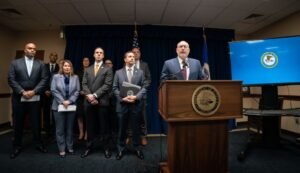March 19, Los Angeles: In a significant shift, the University of California (UC) system announced Wednesday that it will no longer require faculty job applicants to submit “diversity statements” as part of their applications. The decision comes amid a heated national debate over diversity, equity, and inclusion (DEI) programs, with the Trump administration threatening to cut federal funding to institutions that maintain such initiatives.
For years, many UC campuses have asked faculty candidates to provide one- to two-page statements detailing how they have supported diversity in their academic or professional work. These statements, which became common in the early 2000s and gained traction in the 2010s, were intended to ensure that faculty were committed to fostering inclusive environments. However, they also sparked controversy, with critics arguing that they could pressure applicants to focus on issues outside their expertise or experience.
Katherine S. Newman, UC provost and executive vice president for academic affairs, explained the decision in a letter to campus leaders. “The requirement to submit a diversity statement may lead applicants to focus on an aspect of their candidacy that is outside their expertise or prior experience,” she wrote. While stand-alone diversity statements will no longer be required, faculty can still voluntarily highlight their contributions to inclusive teaching, research, and service during the academic review process.
The move has drawn mixed reactions. Some see it as a pragmatic response to mounting political pressure. Brian Soucek, a UC Davis law professor, called it “an attempt at advanced appeasement of the Trump administration’s current threats.” He noted that UC leaders and faculty have long studied and advocated for diversity statements as a way to address gaps in scholarship and better serve a diverse public.
The decision comes as the UC system faces federal investigations into allegations of discrimination against white, Asian American, and Jewish employees and students. Last month, the Department of Education issued guidance warning schools that DEI programs including minority-focused scholarships and cultural graduation ceremonies could jeopardize federal funding. While the guidance did not specifically target diversity statements, it broadly criticized the use of race in admissions, hiring, and other institutional programs.
Across the country, schools have been scrambling to adjust. Some have shuttered diversity offices or rebranded them to remove references to “diversity” and “equity.” The University of Southern California (USC), for example, merged its campuswide diversity office with a “culture” team and removed diversity language from department websites.
Despite these changes, UC leaders insist their commitment to diversity remains unwavering. “The regents stated that our values and commitment to our mission have not changed,” Newman wrote. “We can continue to effectively serve our communities from a variety of life experiences, backgrounds, and points of view without requiring diversity statements.”
Janet Reilly, chair of the UC Board of Regents, echoed this sentiment, affirming that the university “will continue to embrace and celebrate Californians from a variety of life experiences, backgrounds, and points of view.”
The debate over DEI programs reflects broader tensions in higher education and society at large. For supporters, these initiatives are essential to addressing historical inequities and creating more inclusive institutions. For critics, they represent overreach and a departure from merit-based principles.
As the UC system navigates this complex landscape, the decision to eliminate mandatory diversity statements marks a pivotal moment. It raises important questions about how institutions can balance their commitment to diversity with the realities of political and legal pressures. For now, the UC system is betting that it can uphold its values without the formal requirement of a gamble that will undoubtedly be watched closely by universities across the nation.
In the end, the conversation about diversity in higher education is far from over. It’s a deeply human issue, touching on identity, opportunity, and the kind of society we want to build. As UC moves forward, the challenge will be to ensure that its actions align with its ideals and that its commitment to inclusion remains more than just words on paper.
Get more News Headlines on our Social Platforms And Do Follow.








Average Rating